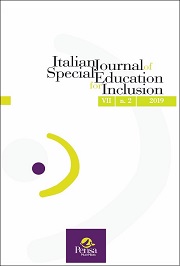The inclusion of “special educational needs” pupils. A critical assessment
DOI:
https://doi.org/10.7346/sipes-02-2019-26Abstract
This article presents the synthesis of a research path concerning the inclusion of pupils with “special educational needs” in the Italian primary school. The project refers to the inclusive paradigm, promoted by Pedagogy and Special Education, which prompts one to consider, realize, rethink, and renovate instruments, languages, attitudes, ideas, and educational-didactic proposals to read the differences and diversities of each and every one as special modalities of placing oneself in the current, diversified and complex contexts of life. Through the careful comparative investigation of the “special educational needs” pupils attending three unified schools (“istituti comprensivi statali”) in central Italy, this explorative research aims at surveying the presence and/or scarcity of the rates of scholastic inclusion in relation to some of the main indicators, such as socialization, accessibility, obstacles/barriers and facilitating agents, processes of learning, relational dynamics in the classroom, educational-didactic strategies, evaluation criteria, according to a non-medicalizing perspective capable of activating specialized and curricular teachers in the reduction of the handicap.


